How to make a hunter
- 17/04/2024
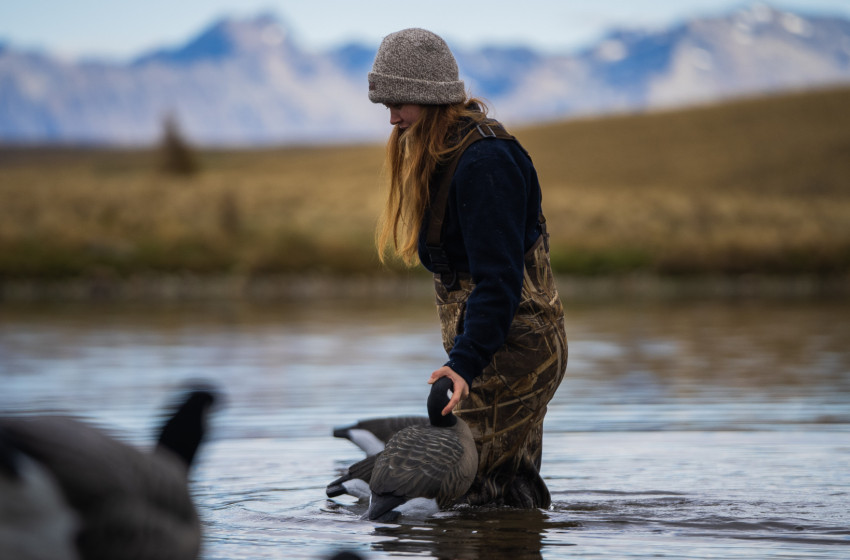
Written by - Callum McKenzie
Over the past few years, my hunting habits have changed significantly due to three major changes in my life - our children. I’m still lucky enough to do my own thing from time to time and have an awesome bunch of mates to hunt with. I believe that there are two ways to approach life, although every individual's situation is unique.
You can choose to mould into your kid's lives, or you can mould them into yours. Sure, it’s not always as simple as that, but it’s a good way to start the thought process. I may be a touch biased, but I believe waterfowling is an awesome way to introduce both kids and newbies into our pursuit. From hunting big open water, braided rivers, farm ponds or paddocks and fields, there is a hunt that will suit almost anyone in just about any situation.
While most of this article shares what I’ve learnt about getting my own kids involved, a lot of the tips and tricks will work for encouraging folk of any age into our great pursuit. Plan your hunt around your hunting companions. The first two pieces to the puzzle are location and the weather. If access is available to private land, say a pond or a paddock, you are off to a pretty good start. It's likely that you can drive close to your setup location, which minimises a long walk and makes it easier to bring more gear. I’ve had the privilege of hunting at some ponds with very well set-up blinds - comfy seats, shooting galleries, shelves for ammo and a half-decent roof. These are a few of the things that can make life easier and more enjoyable for someone new, especially if it’s a bad weather day. You will have more control over variables such as other hunters or the general public being in the same area, and the likelihood of a successful hunt will be more under your control. Having fewer people and hunters about, being able to drive to your spot, and not having to wade, and so on can make your hunt a little more hassle-free and an ideal way to introduce new blood to our passion.
That’s not to say planning a hunt on public land cannot be done, but a bit more knowledge and effort is likely to be needed to make a successful and enjoyable hunt. Boats, wading, changing rivers, deep water and other hunters are all elements of risk that must be taken into account, depending on your location. Being mindful of your companions' limitations is crucial, and communication is key. I do believe that getting out of your comfort zone is good for you but there is a limit and communicating that with your hunting party may be the difference between wanting to go out again or staying at home. Understanding the location and its behaviour during different weather conditions will help you maximise your time spent there. It would not be ideal to wade across a decent piece of water to hunt a southerly with kids in tow, knowing that you’ll need to cross back over in the wind later.
You may need to settle for somewhere a bit closer to the truck. It might not be exactly where you want to hunt, but at least you know you will get home safely with a happy crew, and most importantly, they’ll want to come out next time!
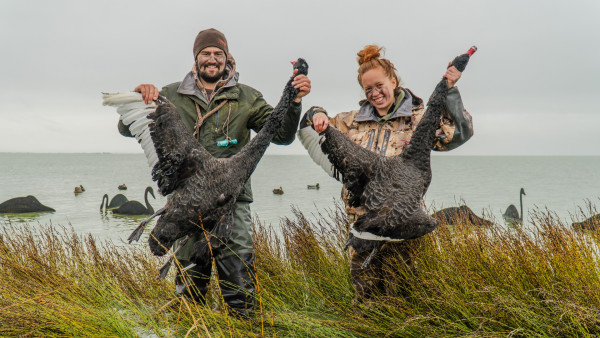
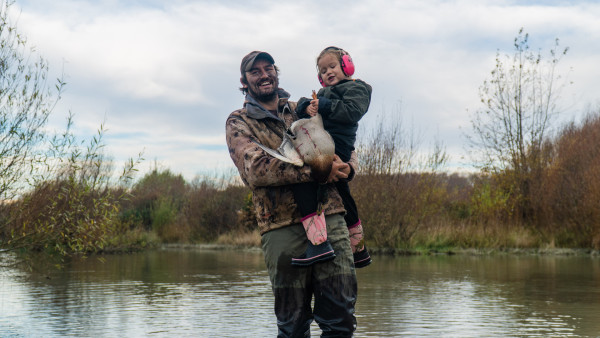
Knowing when to pack up and call it a day is crucial.
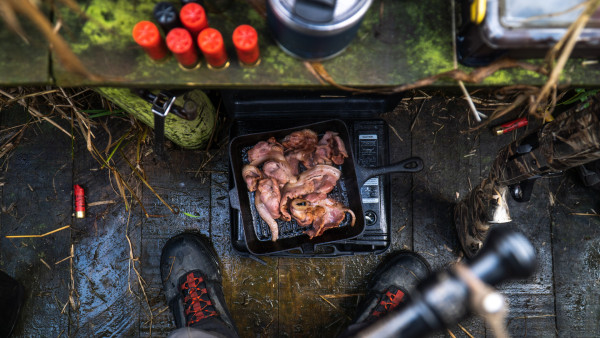
If there is anything that brightens the day, it must be some half-decent food.
Little comforts will go a long way, especially when taking kids out hunting. Anything that I can do to make it easier and more enjoyable for my kids is worth doing. Towing them in the canoe may mean a bit more effort for me (and I need the exercise anyway), but it means they get to sit back and take it easy. It also allows me to cart a bit more gear. This might include a gas cooker, a couple of seats or even a cooler for some food. If there is anything that brightens the day, it must be some half-decent food. After an early start, some cold hands/noses and hopefully a duck or two in the bag, the definition of decent isn’t overly high. I’m sure most of us know how good a couple of lamb chops or a few pieces of bacon slapped in some bread can be while on a duck hunt. Add the luxury of tomato sauce and butter, and it doesn't get much better! You can never have too many snacks, so be sure to throw a few fan favourites in there. Chocolate fish always seem have a place on our hunts. Boiling water is as easy as it’s ever been, so there’s not really any excuse for not having some coffee, tea or hot chocolate on hand for a warm drink. They never seem to be refused, and as I always say about gear when I’m wondering if I should take it - “You are better off looking at it, than looking for it.”
Knowing when to pack up or call it a day is crucial. Most people don’t understand our way of thinking regarding waterfowling. I have seen some people go from incredibly restless and impatient in their daily lives to the most relaxed, easy going people when out on a hunt. It is amazing what a duck can do to some people. Most folk won’t understand why we are happy to just sit down, relax and say “Another hour. . . something might fly”, so being mindful of how the hunt is going for your friend or family is one thing you really need to keep an eye on. With kids especially, there is no point in forcing them into something they don’t want to do. I always give my kids the option to come or to stay home, and when they want to come on a hunt I do my best to make it as enjoyable for them as possible. Half the time we might not fire a shot, or we end up going on a wee adventure in the canoe, so the sooner you realise it’s less about the hunting and more about the adventure of the hunt and simply spending time together, the better it is for everyone involved.
Don’t be afraid to give your hunting buddy a job or responsibility. It will get them involved and allows them to contribute to the hunt. I’ve found that when people are contributing and are invested in the hunt they are far more likely to enjoy it and want to come back again. There’s no harm in teaching them something new. It may take a wee bit of patience on your part, but in the long run, it could take a bit of pressure off you and may even ignite a spark that’ll keep them coming back for more. Helping with the decoys, cooking up a feed and even teaching them about a duck call are options. Start with a simple ticka ticka (feeding call) or a drake whistle. Give them the remote for the motion decoy, or the handle of the jerk string. Sharing our knowledge is one thing that we can never do enough of. How much information has been lost over the years because we were too stubborn to share or pass it down to the next generation of hunters/waterfowlers? While sharing knowledge is just passing on information, it is also an opportunity to educate and show new hunters good ethics and proper behaviour. I think that when we see hunters slip up, make a silly mistake or carry on like idiots, it has a lot to do with ethics, morals and role models or lack of. It could just be that that’s normal behaviour for those people because that was the environment they were taught in, or that they may be new to the sport, giving it a go and really have no idea how to go about it.
If you are banking on bagging a few birds, don’t. Take the pressure off yourself now. The best thing to bank on is trying to create an experience that everyone will enjoy and want to come back and do all over again. Half the time I take my kids out I don’t fire a shot, and we seem to end up on some sort of adventure looking for birds or flowers. That's what they love doing and allows me to share my passion with them at the same time. When it comes time to pull the trigger,I want to make it as quick and clean as possible. Getting the ducks in close, over the decoys and giving all the hunters the best chance to take the shot. I know clean kills can’t always happen, and it can sometimes be out of our control, but the last thing I want my kids to see is a wounded or maimed duck because I made a poor decision. If your beginner is at the point they can shoot, and you have a choice between a nice wooded hole where ducks will present nicely for a shot, or a big open river bank with a lot of pass shooting, opt for the better-presented ducks even if it may mean fewer of them. Your newbie will get to see awesome duck behaviour, get a closer experience with them, and have better opportunities for cleaner harvest. Wounding a duck early on may turn them away from the pursuit.
If the hunt has been a total success with tummies full of hot drink and yummy food, everyone has kept warm, a skill was taught on how to help next time and then finally a bird was shot, then finishing the hunt at home by showing your mate or kids how you harvest the duck and what you do with it to prepare the meat for dinner is a bonus.
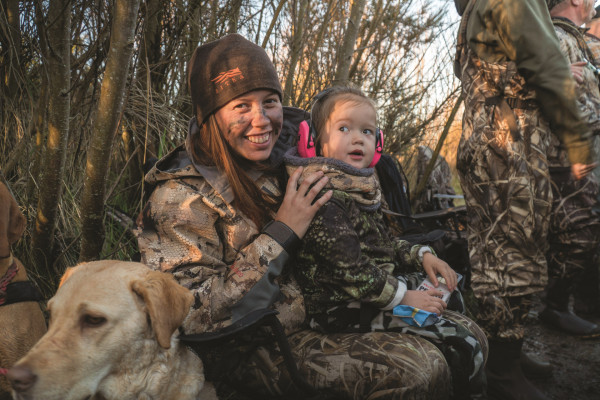
If you are banking on bagging a few birds, don't. Take the pressure off yourself now. The best thing to bank on is trying to create an experience that everyone will enjoy and want to come back and do all over again.

Finishing the hunt at home by showing your mate or kids how you harvest the duck and what you do with it to prepare the meat for inner is a bonus.